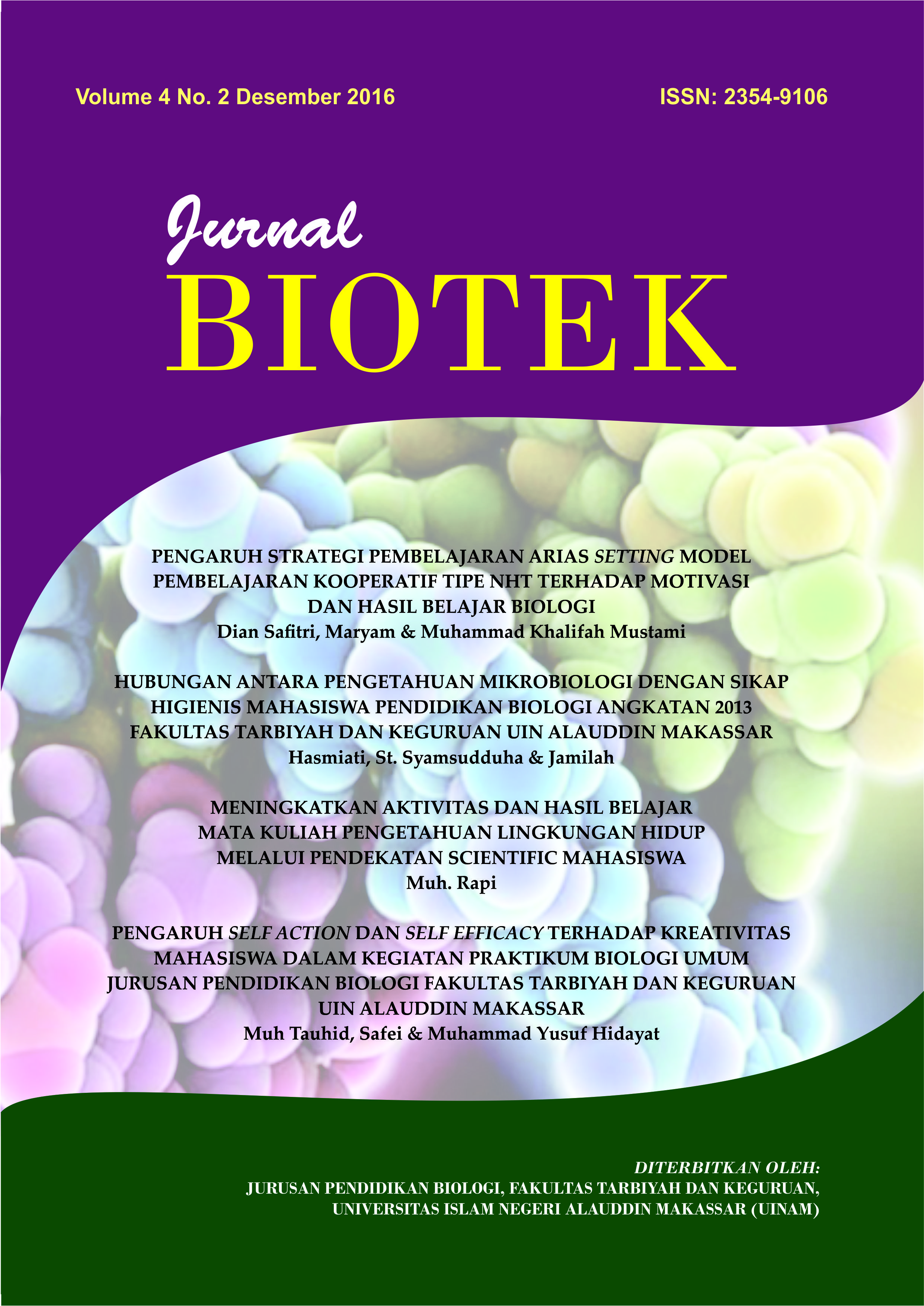MENINGKATKAN AKTIVITAS DAN HASIL BELAJAR MATA KULIAH PENGETAHUAN LINGKUNGAN HIDUP MELALUI PENDEKATAN SCIENTIFIC MAHASISWA
Abstrak
This study aims to determine the increased activity of learning and learning outcomes by applying a scientific approach to the subject of environmental science students of Biology Education Studies Program class of 2013. The research is a classroom action research design model Sanford and Kemmis shaped cycle consists of four phases , namely: 1) planning, 2) acting, 3) observing, and 4) reflecting. Data were analyzed descriptively qualitative and quantitative descriptive. The research found the application of a scientific approach to learning courses environmental knowledge can improve students' learning activities. Scores acquisition of learning activities of students on the learning aspects observed in the first cycle with the average percentage of 72.36% and the second cycle increased to an average 84.76%. This means an increase of 12.40%. Similarly, the student results with the application of scientific approach tends to increase from the first cycle to the second cycle. It can be seen from the average score obtained by increasing that average 77.56 students in the first cycle to average 83.78 in the second cycle. Thus an increase in the score results learned from the first cycle to the second cycle of 6.22.
##plugins.generic.usageStats.downloads##
Referensi
Atsnan, M.F., dan Rahmita, Yuliana Gazali. (2013). Penerapan Pendekatan Scientific dalam Pembelajaran Matematika SMP Kelas VII Materi Bilangan (Pecahan). Prosiding Seminar Nasional Matematika dan Pendidikan Matematika. ISSN 978 – 979 – 16353 – 9 – 4. Online. (Diakses di http://eprints.uny.ac.id/id/eprint/10777, pada 1 Oktober 2014)
Dewey, J. (1938). Experience and education (1st ed.). New York: Touchstone.
Djamarah, Syaiful Bahri. (2008). Psikologi Belajar. Jakarta : Rineka Cipta.
Nurohman, Sabar. (2008). "Pendekatan Project Based Learning sebagai Upaya Internalisasi Scientific Method bagi Mahasiswa Calon Guru Fisika." Jurnal FPMIPA UNY: Tidak diterbitkan. Online, (Diakses di http:// ejournal.undiksha.ac.id/index.php/ semnasmipa/ article/view/2688 /2270, pada 22 Maret 2014).
Kementerian Pendidikan dan Kebudayaan. Peraturan Menteri Pendidikan Nasional Nomor 81A Tahun 2013 tentang Implementasi Kurikulum 2013.
Piaget, J. (1950). Psychology of intelligence. New York: Routledge.
Republik Indonesia, (2009). Undang-Undang No. 20 Tahun 2003 Tentang Sistem Pendidikan Nasional. Cet. II; Jakarta: Sinar Grafika.
Romanov, Kalle & Nevgi, Anne. (2008). Student activity and learning outcomes in a virtual learning environment. Learning Environ Res (2008) 11:153–162
Rusman N dan Abd. Rahman, (2010). Panduan Pengembangan Profesi Guru dan PTK, Depok: Karisma.
Sanjaya, Wina. (2011). Strategi Pembelajaran Berorintasi Standar Proses Pendidikan, Jakarta: Kencana Prenada Media.
Suparman, Atwi. (2012). Desain Instruksional Modern: Panduan Para Pengajar dan Inovator Pendidikan, Jakarta: Erlangga.
Taniredja, Tukiran. (2010). Penelitian Tindakan Kelas untuk Pengembangan Profesi Guru. Bandung: Alfabeta.
Tim Penulis. (2013). Pedoman Edukasi UIN Alauddin Makassar. Makassar: UIN Alauddin
Vygotsky, L. S. (1978). Mind and society: The development of higher mental processes. Cambridge, MA: Harvard University Press.
Yaumi, Muhammad dan Ibrahim. (2013). Pembelajaran Berbasis Kecerdasan Jamak, Jakarta: Kencana Prenadamedia Group.
Yatmoko, Susilo Fitri. Aktivitas-aktivitas Belajar Siswa. Online: (Diakses di http://susilofy. wordpress.com/2011/01/18/aktivitas-aktivitas-belajar-siswa/, pada 22 Maret 2014).
Authors who publish with Jurnal Biotek agree to the following terms: Authors retain the copyright and grant Universitas Islam Negeri Alauddin Makassar right of first publication with the work simultaneously licensed under a Creative Commons Attribution License (CC BY-SA 4.0) that allows others to share (copy and redistribute the material in any medium or format) and adapt (remix, transform, and build upon the material) the work for any purpose, even commercially with an acknowledgement of the work's authorship and initial publication in Universitas Islam Negeri Alauddin Makassar. Authors are able to enter into separate, additional contractual arrangements for the non-exclusive distribution of the journal's published version of the work (e.g., post it to an institutional repository or publish it in a book), with an acknowledgement of its initial publication in Universitas Islam Negeri Alauddin Makassar. Authors are permitted and encouraged to post their work online (e.g., in institutional repositories or on their website) prior to and during the submission process, as it can lead to productive exchanges, as well as earlier and greater citation of published work (See The Effect of Open Access).

This work is licensed under a Creative Commons Attribution-ShareAlike 4.0 International License.



